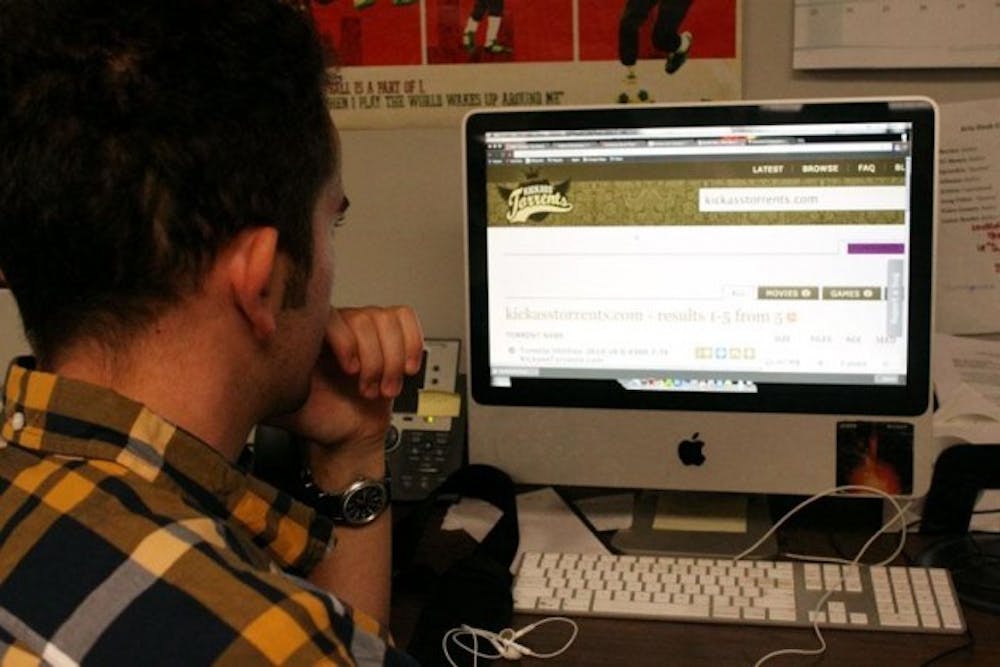Kyle Bihrle has never gone on tour without something going horribly wrong on the way. If it's not the van breaking down, it's having insufficient funds for gas or food for his comrades in hardcore band Sirens and Sailors.
Money is tight with many students illegally downloading music online.
"Record sales are crucial to be noticed by record labels and they're also important for unsigned bands so they can have enough money to tour independently," Bihrle said. "If nobody buys our album, we have a harder time."
Since the days of Napster and the start of popular illegal downloads, music sales have dropped from $14.6 billion in 1999 to $7 billion in 2011 - a 53 percent drop, according to the Recording Industry Association of America (RIAA). This drop in sales affects big-name artists, recently signed artists and all of the people involved in producing an album.
Offenders of copyright infringement and piracy can face jail time and fines up to $250,000. It's difficult, however, to detect every person using various methods to illegally obtain music and other media.
UBIT has implemented a program for students who violate the Digital Millennium Copyright Act (DMCA). Once UB receives a copyright infringement complaint from the DMCA, the person responsible is identified and is enrolled in the copyright course on UB Learns if it's his or her first offense. If the behavior continues or if the violator fails the course, he or she can face UB email account suspension or fines.
The RIAA website states that all universities are required to have regulations in place for on-campus piracy due to the Higher Education Opportunity Act (2008).
The university, however, can't catch every perpetrator, and many students continue to illegally download in their dorm rooms.
Johnny Sparrow*, a senior media study major, downloaded music through UB's wireless Internet system when he lived on campus.
"I illegally downloaded music because, honestly, it generates buzz for up-and-coming local artists," said Sparrow, who is a musician. "Times have changed and it's impossible to stop technology from progressing even more, so the music industry has to adapt in some other way."
Remus Stanford*, a senior biology major, agrees with Sparrow. Stanford said he downloads music on campus because the Internet connection is faster than the connection he has at his apartment. Stanford is also a musician.
There are many ways to illegally download music from the Internet. Peer-to-peer programs similar to Limewire and Frostwire still exist, but, recently, bittorrent programs have become the norm.
'Torrenting' is essentially downloading small pieces of files from different web sources at the same time. The process makes it harder to track where the file originated, making it more difficult for the originator to be caught. Sites like KickassTorrents and Pirate Bay have become a staple for any media pirate.
Though they are still regarded as worldwide problems, torrenting and piracy trends have shown a decline in recent studies. Illegal downloading decreased 26 percent last year, according to the Annual Music Study of 2012. Almost half of the participants surveyed cited streaming sites like Spotify and Soundcloud as an alternative.
Spotify even has an app for smart phones. For $10 a month, listeners can stream all the music they want - legally. Pandora and other online radios have also developed apps.
These sites and programs may be legal, but artists rarely profit from them.
"I'm sure piracy and not seeing money for your art is frustrating for bigger artists," said Andy Leonard, the vocalist of hardcore band Endeavor. "The industry needs to adapt for this change like it has in the past. There are plenty of other ways to make money than on music."
For the hardcore and metal scene, the Internet has been the main way for artists to get noticed. Some artists in the genre encourage their fans to illegally download their music and, if they like what they hear, come to a show and buy merchandise.
Record labels and their executives care about sales and profit. It's difficult to garner huge album sales in the current state of the industry, so it's more important than ever for artists to sell merchandise and sell out tours if they want to be successful. The more fans that attend a show, the more money the band walks away with at the end of the night.
"When a fan buys music or merchandise from us, they're helping us put fuel in the tank, they're helping to feed us and they're helping us fix whatever gets damaged along the tour," Bihrle said. "Without this support, we wouldn't be able to tour and do what we love."
The question is: Does pirating music affect up-and-coming artists more than big names like Lady Gaga or Drake?
Albums leak to the Internet all the time and digital music sales remain pretty steady. Album sales are becoming less of a contributing factor to a musician's success and overall worth. Bands end up making more profit from fans coming to shows and buying shirts than they would by producing an album for sale.
"Pirating from us is no different than pirating from Justin Bieber," Bihrle said. "He has a larger fan base, so it might not affect him as much with the profit he makes off his shows. But he's still making art and losing income that he deserves."
Legal music-streaming sites may be an alternative to pirating, but illegally downloading remains a threat. The age of Internet piracy is a product of technology progression similar to the progression of cassette tapes to CDs.
"If a kid downloads our album, comes to a show and buys a shirt, then we're even," Leonard said. "If he just downloads our art illegally, then he wasn't a friend or a fan to begin with."
*Names have been changed to protect the sources' privacy.
Email: arts@ubspectrum.com





